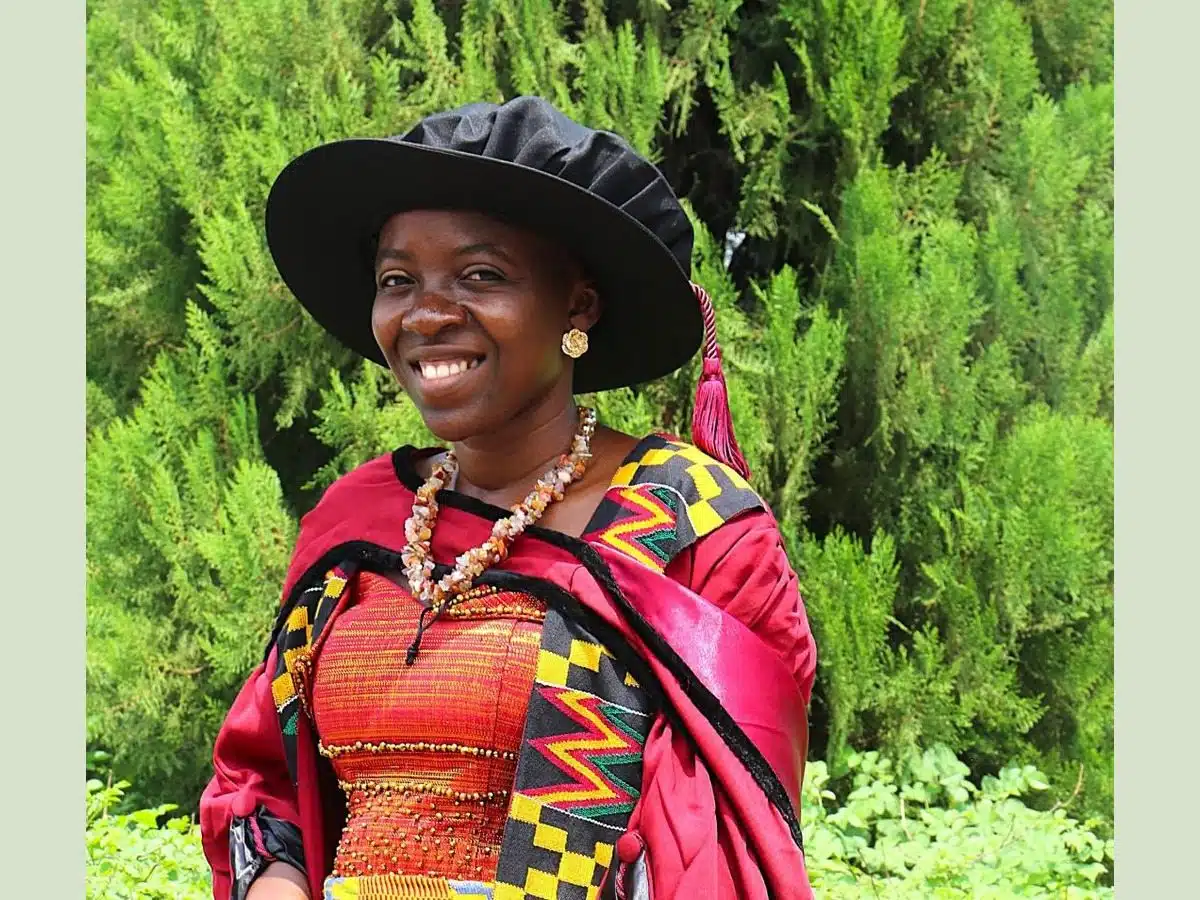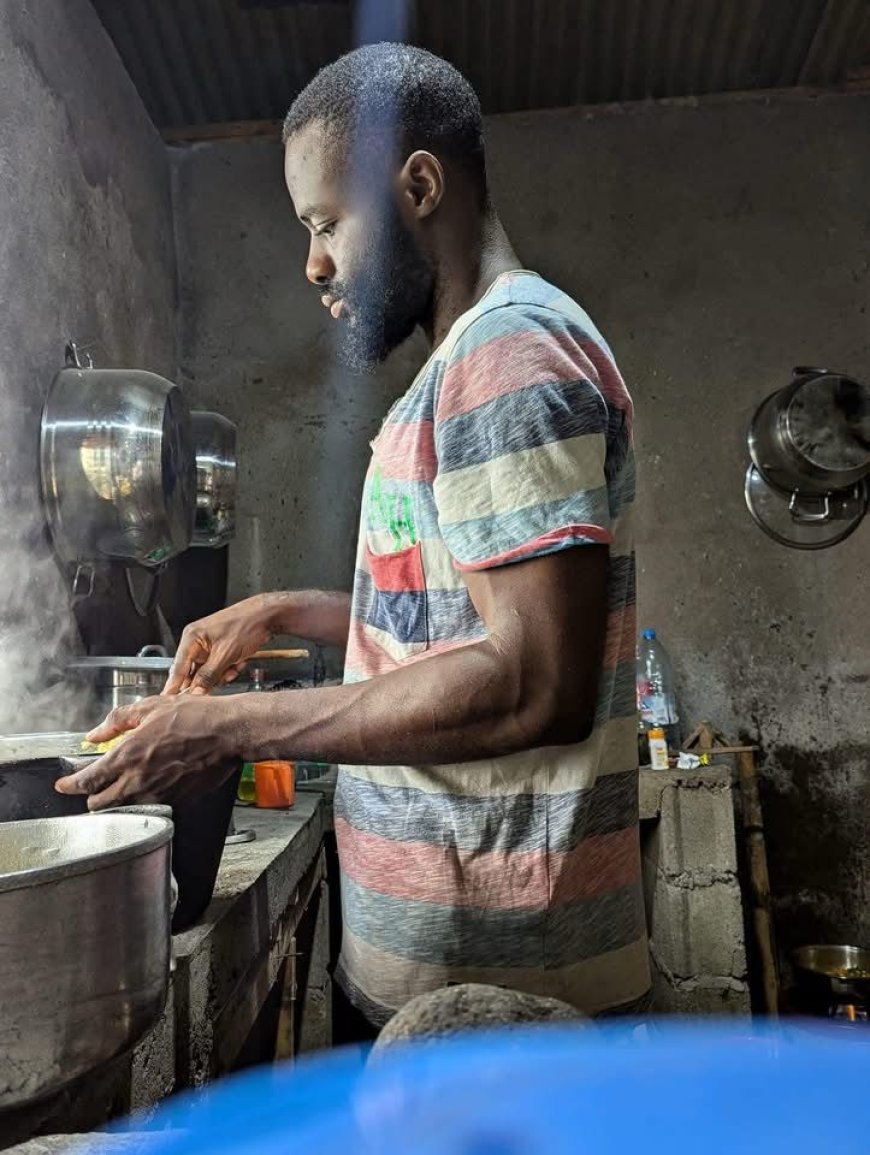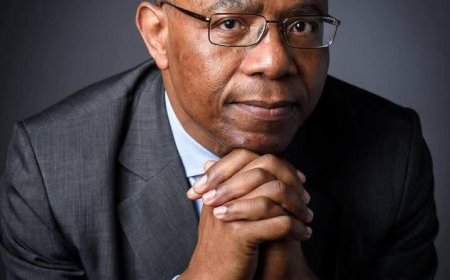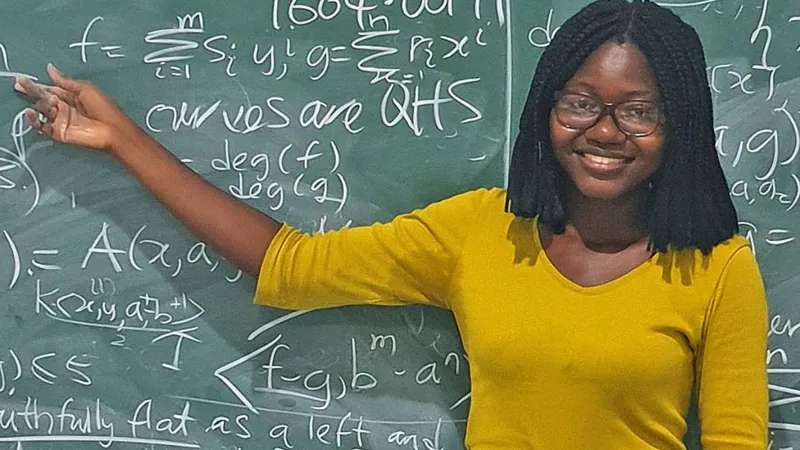Meet the first female to obtain PhD in Mathematics from the University of Ghana

In a historic milestone for the University of Ghana, Dr. Gloria Agyeiwaa Antwi Botchway has become the first woman to earn a PhD in Mathematics from the University of Ghana, shattering barriers, overcoming gender-based perceptions and inspiring future generations of female Mathematicians in a field long dominated by men.
Dr. Botchway's journey from the village of Akaa Buem in the Oti region to becoming the first female to earn a PhD in Mathematics from the University of Ghana, Legon, is a demonstration of her resilience and determination.
Born into a family of four, she is the second child of her parents. When her family moved to Accra for her mother’s education, they faced significant hardships, living with an aunt who struggled to make ends meet while living in a crowded compound where the challenges of life were evident.
Her childhood years were not without challenges. At just seven years old, Dr. Botchway began hawking goods to help make ends meet.
“I remember selling pure water and foodstuffs like yam and fish. It was tough, but I enjoyed it because I loved anything that had to do with business and accounting,” she recounted during an interview with the Public Affairs Directorate News Desk. Despite her mother’s concerns about the dangers of selling by the roadside, she embraced the experience.
Her school life was equally challenging. While her classmates brought a variety of foods to school, Dr. Botchway often packed leftover banku, which she and her brother would hide to avoid teasing. “We do the pepper in the morning. Usually, there was no fish. So, we hide behind the staircase because we didn't want anybody to see what we were eating. I would starve myself just to buy food for my younger brother. I felt responsible for him,” she reflected, highlighting the sacrifices she made during those difficult years.
After four years in Accra, the family moved to Asamankese, where she attended Life Preparatory School. Following another move to Winneba, she continued her education at University Primary on North Campus.
These frequent relocations, a total of six schools during her basic education, forced her to adapt to diverse teaching styles and curricula, posing unique challenges and making her “not like science” because different topics were treated in all the schools she went to.
The family’s living conditions were difficult, often sharing a small room with numerous relatives. She recalls living in a single room in Winneba with her mother and siblings, squeezed into a space that offered little privacy. “We made do with what we had, but it was tough,” she said.

Her experiences in Accra were marked by crime and instability, where gunshots from nearby gang members and police conflicts were a common occurrence. “The police used to raid that area. You hear gunshots. And because the rooms are very small, there were a lot of people in it. So, in the evening, everybody comes out and we sleep outside on the compound.
Everybody lays a mat in front of their room and when the raids come like that, it's running, helter-skelter. Sometimes you can even enter someone's room. Yes, because it's at night and you don't know. You may not see and then you may enter someone's room.,” she recounted.
Despite these hardships, Dr. Botchway's determination never declined. She completed her basic education wearing the same uniform from class four through to junior high school, as financial constraints made it impossible to buy new clothes. “Life hasn’t been rosy; it’s been difficult,” she admitted.
Yet through it all, her mother remained a steadfast source of support, ensuring that Dr. Botchway could continue her education against all odds. "My mom too has been there for me. During the PhD she was still working. She wasn't on retirement, but she made time for me and encouraged me a lot", she said.
Transitioning to secondary school at Accra Girls, Gloria initially focused on Business subjects but soon discovered her true passion for Mathematics. “I’ve always loved Maths. It challenges me, and I wanted to be in a field where few people ventured,” she said.
Her secondary school math teacher recognised her potential and urged her to pursue a career in academia. "He just told me that, Gloria, you have to be a Lecturer," she remembers. This encouragement, coupled with her innate love for the subject, set Dr. Botchway on a path that would ultimately lead her to make history.
It was this passion that led her to the University of Ghana, where she not only excelled academically but also forged a path for future generations of female mathematicians. When she began her studies at the University of Ghana, she initially opted for a Business Administration course but quickly chose Mathematics.
Inspired by mentors like Prof. Elsie Kaufmann and Dr. Adu Gyamfi, who advised her on the advantages of a mathematics degree, she ultimately committed to the subject. “I wanted a challenging field where few people ventured,” she explained. “I realised that with a Math degree, I could still pursue Accounting if I wanted”, she added.
As she progressed through her undergraduate and graduate studies, she faced numerous challenges, both academic and personal. "Math is challenging. It's not easy," she admits. "But if you love it, you would do it."
One of the most significant challenges was the lack of female role models in her field. "People do not expect that you would go on with the Math," Gloria explains. "Sometimes they were very discouraging." However, these doubts only fueled her determination to succeed.
In an interview with Dr. Botchway’s colleague, Justine Johnson, he described her as a dedicated and ambitious individual who is practical and determined.
He mentioned her leadership skills and how she helped set up a Maths study group, which helped him become proficient in Math. He also praised her determination, stating that “nothing is impossible, and she always strives to solve problems.”
Mr. Johnson described her motivational approach to group work. According to him, she encouraged everyone to play a role by spread different questions for each person to focus on and then providing the solution if needed.
Balancing her academic pursuits with her personal life presented another set of challenges. Dr. Botchway got married during her master's programme and had her two children before graduation.
She went on to have two more children during her PhD studies. "Life has to go on," she says, crediting her supportive husband and family for helping her manage her multiple roles. "My husband has been extremely supportive. In fact, countless times he would ask, ‘what have you done?’ Even though he doesn't have any idea about what I'm doing, he would ask, ‘today, what did you do?’"
Mrs. Margaret Aduam, mother of Dr. Botchway, recounts how she and other family members provided support to her throughout her journey. “In fact, I was always there for her because I noticed that the PhD was not an easy thing at all. So sometimes I take all her children to my house just so she could have time to study. We also provided her with prayer and emotional support. Sometimes she's worn out and then I tell her, ‘Gloria, you can do it’,” she said.
“The family is excited and proud of Gloria's achievement, with everyone in Jasikan, congratulating her and even wanting her to return home. They feel proud of her accomplishment and the excitement it has brought to the community,” Mrs. Aduam added.
In 2024, Dr. Botchway's perseverance paid off when she became the first woman to earn a PhD in Mathematics from the University of Ghana. This achievement is not just a personal triumph but a significant milestone for gender representation in STEM fields in Ghana.
Now with her PhD, she is focused on making a lasting impact in her field and inspiring the next generation of female Mathematicians. Dr. Botchway is involved in a project called "Enhancing M in STEM," which aims to improve Mathematics education for girls in secondary schools.
"I want to be able to see Math being applied to something relevant," she says of her research goals. "It's not just a theoretical thing, but we are solving real problems."
Her ambitions extend beyond research. "I'm definitely aiming for professorship," she declares, setting her sights on becoming the first female Professor of Mathematics at the University of Ghana. To young women considering a career in Mathematics, she offers this advice: "Don't let what people say stop you. Don't let the environment stop you. In fact, don't let yourself stop yourself”.
Professor Deborah Atobrah, Director of the Centre for Gender Studies and Advocacy (CEGENSA) at the University of Ghana, underscores the importance of Gloria's achievement. “This is a very big achievement. It's a huge feat in gender work for STEM. However, you know, we think this has taken too long for us to get here. But nevertheless, we still celebrate this very important achievement”, she said.
She also highlighted the challenges faced by girls in STEM fields with rural areas experiencing less appreciation due to lower education levels. ‘The perception of women in STEM fields has worsened due to limited job opportunities and a drop in education value.’
To address issues regarding women education especially in STEM, she suggested financial aid should be designed to cater to the specific needs of female students. ‘Additionally, guaranteed opportunities for Ph.D. holders could encourage more women to pursue these fields, promoting gender equality and career growth.’
Speaking to the Head of the Department of Mathematics, Dr. Chisara Peace Ogbogbo, she showered praises on Dr. Botchway and applauded her work ethics. “She's a very serious lady, very serious-minded. She takes whatever she has to do very seriously, I must say. She's one of the people that I can rely on here in this Department. If I ask Gloria to do anything, you know, I am rest assured that she will do it”, she said.
Dr. Ogbogbo also called on government to be intentional in encouraging girls to pursue careers in Math by providing scholarships to female teachers to study Mathematics. She added that the government needs to consult with the Department to make a bold step towards achieving the M in the STEM project which will help change the status quo and encourage girls to pursue careers in math.
Through her academic journey, Dr. Botchway has shown determination and persistence, setting the stage for her groundbreaking achievement. Her story is one of perseverance, representing the spirit of a woman who rose above her circumstances to achieve groundbreaking success.
“She's a unique person, because being the first lady to earn a PhD in Mathematics from UG is a wild achievement, because she could have gone anywhere, but she decided to stay in her home country. So, this inspires a lot of people to not just run, causing brain drain, but stay here and do your best”, JisLord Naaa Ablorh, a level 200 Mathematics student said about Dr. Botchway’s achievement.
Dr. Botchway in her appreciation remarks thanks God for seeing her through it all. She also acknowledged her supervisor, Professor Anthony Yaw Aidoo of Eastern Connecticut State University, for being supportive throughout her PhD journey. She extended appreciation to her Department and the University of Ghana for providing an enabling environment with waived fees.
She also acknowledged Dr. Twum, Professor Seba and Dr. Ogbogbo, for being instrumental in the journey. Carnegie Corporation, through Professor Yaa Ntimoa-Baidu, supported her through the Carnegie Next Generation of Academics, Africa and Banga project. Dr. Botchway also thanked their family, especially her mother, Madam Margaret Aduam and husband for their encouragement. She also thanked her friends for their selfless support throughout their journey.
As Ghana strives to increase female participation in STEM fields, stories like Dr. Botchway's serve as both inspiration and a call to action. Her journey from the market stalls of Teshie to the lecture halls of the University of Ghana demonstrates that with determination, support and access to education barriers can be broken and new paths created.
Source: University of Ghana
























































